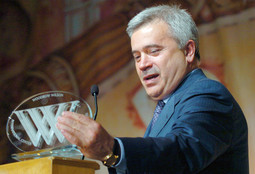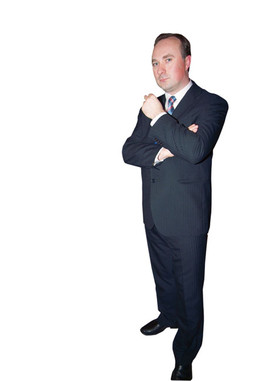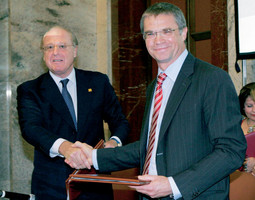Published in Nacional number 651, 2008-05-05
Predator in Croatia
INA under fire from Russian oil giant
Lukoil\'s next move in Croatia will be to seek out oil terminals on the Adriatic Sea, making it the key player on the market
 LUKOIL'S BIG BOSS Vagit Alekperov, president of the board of Lukoil, has been trying for some time to enter the Croatian market "With the purchase of Europa mil Lukoil has only confirmed what ahs been evident for some time now, and that is that it wants to enter the Croatian market. That is very bad news for INA, because Lukoil is a predator company, who aims to wipe out its competition wherever it comes and to introduce a monopoly. Europa mil is too small a company for Lukoil to do so through it, but the purchase should be regarded as a start. In the coming period Lukoil will endeavour to get a part of the existing capacity in the oil loading terminal at the Port of Ploce or a permit to build its own terminal.
LUKOIL'S BIG BOSS Vagit Alekperov, president of the board of Lukoil, has been trying for some time to enter the Croatian market "With the purchase of Europa mil Lukoil has only confirmed what ahs been evident for some time now, and that is that it wants to enter the Croatian market. That is very bad news for INA, because Lukoil is a predator company, who aims to wipe out its competition wherever it comes and to introduce a monopoly. Europa mil is too small a company for Lukoil to do so through it, but the purchase should be regarded as a start. In the coming period Lukoil will endeavour to get a part of the existing capacity in the oil loading terminal at the Port of Ploce or a permit to build its own terminal.
If that happens it will flood Croatia with oil from its refineries in Bulgaria and Romania, and INA will not be able to compete with that either in price or in quality", says Nacional's source, well versed in the situation in the oil industry, commenting the Lukoil acquisition of the Zagreb-based Europa mil Company. Last week Lukoil announced on its Internet site that it had purchased Europa mil. The Zagreb-based company owned nine petrol filling stations in Zagreb and Split, five locations for the construction of new filling stations and a 8,000 cubic metre capacity oil loading terminal in Vukovar on the Danube River. When the news was announced many in Croatia were surprised that Lukoil, one of the largest oil companies in the world. Which last year alone recorded net profits of 8 billion dollars, was buying a small and relatively low profile company in Croatia. Nevertheless, because of the storage capacity at the Vukovar terminal, the purchase of Europe mil was Lukoil's last chance to begin doing business on the Croatian market.
In order for a company to get involved in the sale of oil derivatives in Croatia it has to secure a permit for the Croatian Energy Regulatory Agency. To get the permit it must have a storage space for oil derivatives, a thousand cubic metres of each type of derivative it intends to sell. At least four derivatives are usually offered at Croatian petrol stations, Eurosuper 95 and 98, diesel and Eurodiesel. That means that any company wishing to sell oil derivatives must have at least 4,000 cubic metres of storage space. The rule is not applied strictly in Croatia, and there are still private companies with one or two filling stations where the fact that they have no storage space is tolerated, but it is hard to believe that the state would tolerate that kind of operation from an oil company the size of Lukoil.
After the purchase by Slovenia's Petrol of the Rijeka-based Energopetrol, and Cermak's Tifon by Hungary's MOL, Europa Mil was the last chain of petrol filling stations with sufficient storage space in private ownership. Milodrag Gadze, the owner of Europa Mil, was unwilling to disclose just how much Lukoil paid for his company, saying only that the amount was significantly less than 80 million euro. Nevertheless, it is likely that Gadze used the current situation on the market to sell the company far above its real value. Because Europa mil is a quite unusually organised company. Its nine filling stations, where 11 tonnes of oil derivatives are sold daily, are located in Zagreb and Split, while the storage space is in Vukovar. The great distance makes transport very costly, and that is one of the key items in forming the final price of derivatives. For a company with this kind of sales chain distribution a storage facility somewhere in Zagreb or Split would be much more logical.
 DAMIR POLANCEC practically rejected Lukoil's offer to participate in the privatisation of INA The negotiations between the representatives of Lukoil and Milodrag Gadze allegedly lasted over a year. The chief item under negotiation was the status of the terminal in Vukovar. The terminal, even though it is on the very banks of the Danube River, was constructed and registered as a rail terminal. That did not suit Lukoil because the transport of the oil it intends to import to Croatia from its refineries in Bulgaria and Romania by rail would be very expensive. Transporting oil by river is as much as five times cheaper than by rail. The problem was that Europa mil did not at the time have a permit for the unloading of oil by river. Without this permit Lukoil was unwilling to sign a contract, so a pre-contract was signed three months ago. Only once Gadze had secured the necessary permits did the Russian's go forward on the deal.
DAMIR POLANCEC practically rejected Lukoil's offer to participate in the privatisation of INA The negotiations between the representatives of Lukoil and Milodrag Gadze allegedly lasted over a year. The chief item under negotiation was the status of the terminal in Vukovar. The terminal, even though it is on the very banks of the Danube River, was constructed and registered as a rail terminal. That did not suit Lukoil because the transport of the oil it intends to import to Croatia from its refineries in Bulgaria and Romania by rail would be very expensive. Transporting oil by river is as much as five times cheaper than by rail. The problem was that Europa mil did not at the time have a permit for the unloading of oil by river. Without this permit Lukoil was unwilling to sign a contract, so a pre-contract was signed three months ago. Only once Gadze had secured the necessary permits did the Russian's go forward on the deal.
Lukoil has long been interested in entering the Croatian market. Back in the late 1990s there was an idea on a collaboration between INA and Lukoil, and the president of the oar of Lukoil, Vagit Alekperov, was allegedly even in talks with former Croatian President Franjo Tudjman. The project, however, was never seen through. The attempts by Lukoil to start doing business in Croatia were particularly intense over the past one year. A month ahead of last year's energy summit, when Croatia was visited by Russian President Vladimir Putin, a delegation of Russian business people was in Zagreb, including representatives of Lukoil. In talks with the Croatian Deputy Prime Minister Damir Polancec they sounded out the possibility of getting on board the second phase of the privatisation of INA. As Polancec did not provide them with a clear answer they turned to the acquisition of the remaining available oil companies in Croatia.
Those were Tifon, owned by retired army general Ivan Cermak, and the Rijeka-based Energopetrol. They did not succeed, as they proved to be exceptionally poor negotiators. In the case of Tifon they were the chief candidates. Two company vice presidents agreed upon a price with Cermak in Zagreb, everything was ready for the signing of a contract, but the Russians abruptly decided to slash the price by 10 million euro, regardless of the fact that 10 million euro is not a lot of money for a company the size of Lukoil, and Cermak accepted the offer from the Hungarian-based MOL. Allegedly the Russians had information that Cermak would have to go to the Hague long before it actually happened and totally underestimated the interest of the Hungarians, who wanted through Tifon to secure their position in Croatia, regardless of what would happen in the second half of the privatisation of INA. Something similar happened with Energopetrol, purchased by the Slovene company Petrol. That is why Europa mil was Lukoil's last chance to start doing business in Croatia.
It is, nevertheless, hard to believe that Lukoil will only by way of Europa mil make a significant impact on the Croatian oil derivatives market. Simply put, the company is too small, and the river terminal in Vukovar is not suited for the transport of large quantities of oil. In other words, if its wants to control the Croatian market, Lukoil has to find storage capacity on the Adriatic seaboard. Seaborne oil tankers usually have a capacity of from 25 to 30 thousand tonnes. River barges have a capacity of about 1,200 tonnes. 20 times more ships are required for the transport of large quantities of oil by river than by sea, which creates massive problems in transport manipulation, and then there is the fact that the water level in the Danube River varies and is often unsuitable for navigation. That is why a company like Lukoil cannot base its development strategy on the Croatian market on the basis of the river terminal in Vukovar.
At Lukoil they are aware of this problem and have been lobbying for some time to get a part of the oil terminal at the Port of Ploce or a permit to build a new one. Since the Russina company NeftgazInKor has purchased the refinery in Bosanski Brod, Lukoil it trying through it to secure a part of the capacity of the oil terminal in Ploce. The Russians claim that the Republika Srpska has the right to a part of the capacity there, which is untrue. The operator of the terminal, the Naftni terminali Federacije Company, is owned by the Federation of Bosnia & Herzegovina and has no links to the Republika Srpska. And just as the bodies of the Federation could not influence the decision by the Republika Srpska to sell the refinery in Bosanski Brod to the Russians, by the same logic it follows that the Republika Srpska cannot influence the distribution of capacity in the Ploce terminal. Nevertheless, Lukoil, by way of its influence with leading politicians in the Republika Srpska is putting pressure on the central government in Sarajevo to open a political route to its entry into the Port of Ploce. The Russian company is willing to build a new terminal and to invest over 200 million euro in the effort.
 If it succeeds the Croatian oil company INA could find itself in a very uncomfortable position. Lukoil could then import large quantities of oil derivatives from its refineries in Bulgaria and Romania to Croatia. Also, according to unofficial information, Lukoil is currently in negotiations on the purchase of a refinery on Sicily. It is assumed that the production there would also be targeted to the western Balkan markets. And although INA says it will be finished with the modernisation of its refineries by 2011, Nacional's source says that that will not happen before 2012, and that that was a big problem for the Croatian oil company: "If Lukoil gets a terminal on the seaboard it will be able to import practically unlimited amounts of its high quality derivatives, the kind INA will not be able to produce until it modernises its refineries. And Lukoil can afford to sell them under price and to wipe in the competition by doing so. That is how it operates, and has already done so in a number of countries. In Bulgaria is wiped out all of the smaller oil companies in a very short space of time."
If it succeeds the Croatian oil company INA could find itself in a very uncomfortable position. Lukoil could then import large quantities of oil derivatives from its refineries in Bulgaria and Romania to Croatia. Also, according to unofficial information, Lukoil is currently in negotiations on the purchase of a refinery on Sicily. It is assumed that the production there would also be targeted to the western Balkan markets. And although INA says it will be finished with the modernisation of its refineries by 2011, Nacional's source says that that will not happen before 2012, and that that was a big problem for the Croatian oil company: "If Lukoil gets a terminal on the seaboard it will be able to import practically unlimited amounts of its high quality derivatives, the kind INA will not be able to produce until it modernises its refineries. And Lukoil can afford to sell them under price and to wipe in the competition by doing so. That is how it operates, and has already done so in a number of countries. In Bulgaria is wiped out all of the smaller oil companies in a very short space of time."
Lukoil's acquisition of Europa mil is the start of an attempt by the Russian company to make a big entry onto the Croatian market. Will it succeed in the effort will depend above all on the willingness of Croatian national institutions to protect the interests of INA, where the state still owns a 44 percent ownership stake.
Italy's ENI also in play
The interest of Lukoil, and of the other large Russian oil companies for the markets of the countries of the former Yugoslavia has long been a fact. In Serbia Lukoil purchased Beopetrol, a chain that emerged out of the petrol filling stations that once belonged to INA. Gazprom recently purchased the Naftna industrija Srbije Company for a billion dollars, while the NeftgazInKor Company, soon to be merged with Gazprom, is the owner of the oil refinery in Bosanski Brod. Lukoil also has operations in Macedonia and Montenegro. Lukoil recently negotiated with the Slovene oil company Petrol with the intention of creating a joint company that would include all of the Petrol and Beopetrol filling stations. But the Italian company ENI is also interested in entering the markets of the western Balkans. It is completing work on the modernisation of its refinery in Taranto, which will double its capacity. It is presumed that ENI will want to place the surplus of derivatives it produces on the markets of Croatia, Slovenia and Bosnia & Herzegovina.
Austrians shaping the fate of INA
A big problem for INA at this juncture are the ownership relations within the company itself. The state owns a 44 percent stake. Up to the accession to European Union membership it can retain at most a 25 percent stake, which means that over the coming few years it will have to privatise a further 19 percent of INA stock. On the other hand the Austrian-based OMV has for months now shown an interest in acquiring MOL.
If OMV buys MOL, INA could find itself in an unwelcome situation. It is hard to believe, namely, that the Croatian Competition Agency would approve the creation of this kind of mega-company. It is possible then that OMV would decide to sell the 25 percent stake in INA, and the Croatian oil company would once again find itself on the market. And while no one in the INA leadership wishes to speculate on that kind of scenario, Nacional's sources say that it is possible. One of the companies most interest then in buying INA would likely be the Russian Lukoil.
Related articles
'A profitable INA is in everyone's interest'
The growing number of calls for a possible revision of the key contracts outlining relations between Croatian Government and Hungarian-based MOL will… Više
Latest news
-
28.10.2010. / 14:15
'A profitable INA is in everyone's interest'
-
28.10.2010. / 09:38
Sanader’s eight fear SDP — Won’t bring down Government
-
21.10.2010. / 15:02
Interior Ministry turned a blind eye on Pukanic assassination
-
20.10.2010. / 09:34
Barisic could bankrupt HDZ




